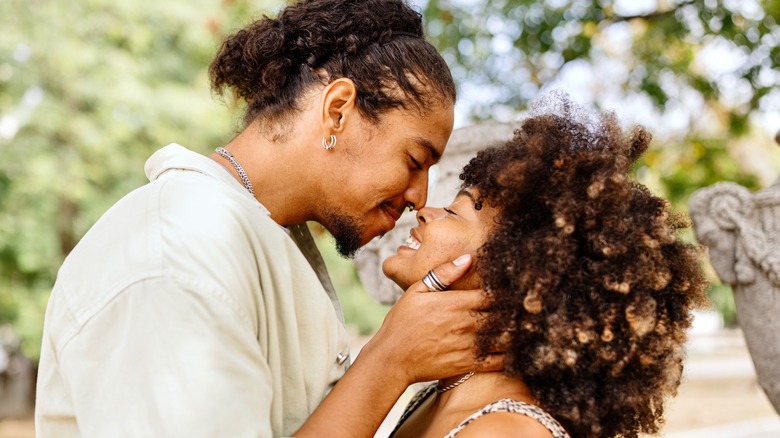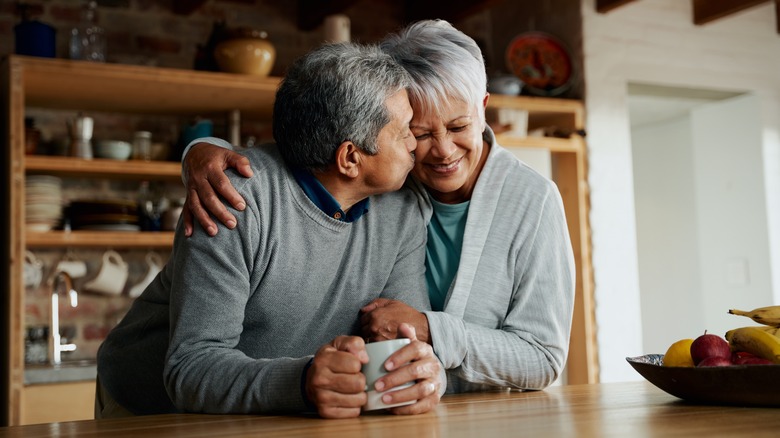Being In Love Has An Unexpected Effect On Your Memory
Whether it's a first date or your 40th wedding anniversary, being in love makes life all the sweeter. We tend to picture a person in love as someone wandering around mindlessly with their head in the clouds. However, research shows us that our mental acuity may be even sharper when we're crushing on someone, specifically when it comes to memory recall.
Being head over heels in love can feel like a high. In fact, experts state there's a scientific reason as to why many of us experience this "Drunk in Love" feeling, as Beyoncé would say. The answer is the neurotransmitter dopamine. Dubbed the "feel-good" hormone, the release of dopamine is what gives you that lovey-dovey feeling every time you see that special someone (via Scientific American). So much so that the brain elicits similar responses to being in love as it does to using stimulant drugs like ecstasy. Knowing this, it's no wonder that new love can be so intoxicating. Although dopamine certainly plays a role in pleasure, it is also important for memory consolidation.
Dopamine release may improve memory
Dopamine is one piece of the puzzle when it comes to the brain's ability to convert short-term memories into long-term memories (via Scientific American). Researchers from a 2012 study published in The Journal of Neuroscience outline how animal studies have shown dopamine release is essential in order to preserve memories that would otherwise last only approximately 4 to 6 hours. In the study, participants between the ages of 65 and 75 who were given the drug levodopa (which then becomes dopamine within the body) demonstrated improved memory recall of images that had been presented to them 6 hours earlier. The images were of various indoor and outdoor environments. While these findings may indicate a general link between dopamine and memory, what's the relationship between our neurotransmitters and romantic memories, specifically?
Odds are, you probably remember the first time a partner said the words, "I love you." Why do we remember our firsts in such visceral detail? "Much like an addict's first high from a gambling win or an addict's first heroin high, we want to re-experience that 'first time' again," cognitive behavioral coach Dr. Robin Buckley told Bustle. "Our brains remember the neurochemical 'high' associated with it and want that experience back."
You remember more information about your partner when you're in love
If your first romantic relationship took place during adolescence, that memory is probably all the more crystal clear in your mind. Memory power is at an all-time high during these formative years as your brain continues to develop neurologically, reports Bustle. With young love, specifically, these "feel good" hormones leave a lasting mark on our still-growing brain. This explains why, even decades later, a specific smell or particular clothing item might suddenly transport you back to the night of your high school prom.
It's easy for the brain to remember information rooted in emotional experiences. In light of this, researchers from a 2015 study published in Social Cognitive and Affective Neuroscience set out to determine whether this same level of memory recall applied to information about a romantic partner rather than just memories of the partner themselves. In one portion of the study, 20 university students who self-reported being highly in love for less than one year were presented with 90 tidbits of information separated into three categories: 30 facts about their partner, 30 facts about a friend, and 30 control words. The information had been obtained in interviews and included the person's favorite actor, color, foods, and more. Participants successfully recalled an average of 34.4 pieces of information out of the 90 presented. Out of the three categories, EEG technology revealed that the students best recalled information related to their romantic partner.



